

When the individual deals with an external event which are the stressors, it creates an impact to the psychological, biological and emotional well-being thus experiencing the process of going through a certain degree of stress internally. There are various stressors that leads young teenagers towards stress and dealing with it is never easy.
What is Stress? - Stressors, Coping and Biology. Mind, the mental health charity - help for mental health problems. Like most websites, we use cookies.

If this is okay with you, please close this message. read more about your options. If this is okay with you, please close this message. If not, please read more about your options. Menu. Processing the Environment. The Science of Stress: From Psychology to Physiology. 5 Things You Should Know About Stress. Effects of Stress. STRESS AND HEALTH: Psychological, Behavioral, and Biological Determinants. Stress symptoms: Effects on your body and behavior. Stress symptoms may be affecting your health, even though you might not realize it.
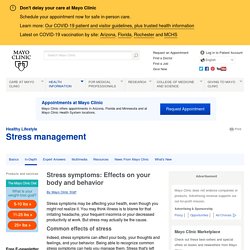
You may think illness is to blame for that irritating headache, your frequent insomnia or your decreased productivity at work. But stress may actually be the cause. EFFECTS OF STRESS TO YOUR HEALTH. The kids won't stop screaming, your boss has been hounding you because you turned a report in late, and you owe the IRS thousands of dollars you don't have.

You're seriously stressed out. Stress is actually a normal part of life. At times, it serves a useful purpose. Stress can motivate you to get that promotion at work, or run the last mile of a marathon. What causes Stress in Young Teenagers / Stressors. What is STRESSOR? What does STRESSOR mean? STRESSOR meaning, definition & explanation. The Teenage Brain: The Stress Response and the Adolescent Brain. Teenage Stress. Teens are under more stress today than ever before.
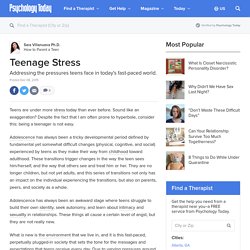
Sound like an exaggeration? Despite the fact that I am often prone to hyperbole, consider this: being a teenager is not easy. Adolescence has always been a tricky developmental period defined by fundamental yet somewhat difficult changes (physical, cognitive, and social) experienced by teens as they make their way from childhood toward adulthood. These transitions trigger changes in the way the teen sees him/herself, and the way that others see and treat him or her.
They are no longer children, but not yet adults, and this series of transitions not only has an impact on the individual experiencing the transitions, but also on parents, peers, and society as a whole. 6 Common Triggers of Teen Stress. Teen stress from a teen perspective. Teens Talk About Stress. What Are the Effects of Cyberbullying? MOE, MSF ‘very concerned’ about spike in youth suicides; experts say more support and awareness necessary. SINGAPORE: The Ministry of Education (MOE) and Ministry of Social and Family Development (MSF) are “very concerned” about the spike in the number of youth suicides this year, said the ministries in a joint statement.

“It is not yet a trend, but we must monitor this closely and take various measures to address it,” said spokespersons for the ministries in response to email queries from CNA. The number of suicides in Singapore rose 10 per cent last year, with suicides among boys aged 10 to 19 at a record high, the Samaritans of Singapore (SOS) said last week. A total of 94 people aged between 10 and 29 killed themselves last year, SOS said. Among boys aged between 10 and 19 years old, there were 19 suicides last year – the highest since it began keeping records in 1991 and almost triple the seven cases recorded in 2017. Number of male teenage suicides hits record high, Singapore News. SINGAPORE - The number of teenage boys taking their own lives reached a record high last year.

Nineteen boys aged 10 to 19 committed suicide in 2018, the highest since suicide figures began being recorded in 1991. In 2017, there were seven suicides by teenage boys. The total number of suicides also rose last year, with 397 reported – up from 361 in 2017, but still fewer than the 429 in 2016. The Samaritans of Singapore (SOS) provided a breakdown of the annual statistics to The Straits Times after they were released by the Immigration and Checkpoints Authority (ICA).
The number of people taking their own lives rose across all age groups, except for the elderly - those aged 60 and over. There were 8.36 suicides per 100,000 Singapore residents, up from 7.74 in 2017. The prevalence of suicide among young people and males is a "significant societal concern", the SOS said, adding that suicide remains the leading cause of death among the young - those aged 10 to 29.
Eating Disorders and Stress. Stress affects everyone on a daily basis.
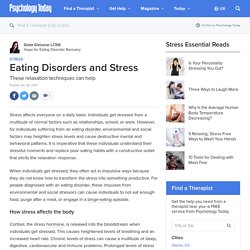
Individuals get stressed from a multitude of normal factors such as relationships, school, or work. However, for individuals suffering from an eating disorder, environmental and social factors may heighten stress levels and cause destructive mental and behavioral patterns. It is imperative that these individuals understand their stressful moments and replace poor eating habits with a constructive outlet that elicits the relaxation response. article continues after advertisement When individuals get stressed, they often act in impulsive ways because they do not know how to transform the stress into something productive.
Stress May Trigger Mental Illness and Depression In Teens - Depression Center - EverydayHealth.com. Your teenage years should be among the best times of your life.
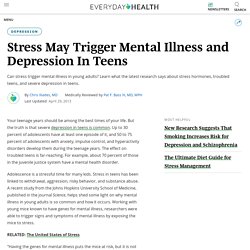
But the truth is that severe depression in teens is common. Up to 30 percent of adolescents have at least one episode of it, and 50 to 75 percent of adolescents with anxiety, impulse control, and hyperactivity disorders develop them during the teenage years. The effect on troubled teens is far-reaching. For example, about 70 percent of those in the juvenile justice system have a mental health disorder. Adolescence is a stressful time for many kids.
High Stress Teens Twice as Likely to Drink or Use Drugs. Why do some teens get involved in substance abuse while others do not?
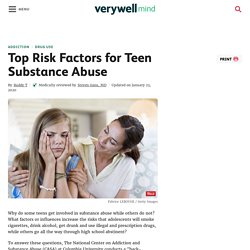
What factors or influences increase the risks that adolescents will smoke cigarettes, drink alcohol, get drunk and use illegal and prescription drugs, while others go all the way through high school abstinent? To answer these questions, The National Center on Addiction and Substance Abuse (CASA) at Columbia University conducts a "back-to-school" study otherwise known as "The National Survey of American Attitudes on Substance Abuse. " Since 1995, this survey has attempted to identify characteristics, situations, and circumstances that increase or decrease the likelihood of teen substance abuse. From the results of several of CASA's 17 published studies, the following risk factors for increased likelihood that teens will smoke, drink or use drugs have emerged.
Key Factors. Stress and adolescent well being. The Importance of stress management and coping skills. Understanding and Managing Stressors. Of course, you've heard about stress and may have even experienced a good amount of it already today.

But do you know what the difference is between "stress" and "stressors? " Stressors are situations that are experienced as a perceived threat to one’s well-being or position in life, especially if the challenge of dealing with it exceeds a person’s perceived available resources.1 When one encounters stressors, the body’s stress response is triggered, and a series of physiological changes take place to allow the person to fight or run. Compas et al. Psychological Bulletin 2001. Stress management is important for the teenagers to progress into adulthood.
5 Tips for Helping Teens Cope with Stress. The American Psychological Association (APA) recently released its Stress in America report (the full report can be found here). This year the report highlighted the stress experienced by American youth (ages 13-17) stating "high stress and ineffective coping mechanisms appear to be ingrained in our culture. " Since the survey has begun, it has continued to find that American adults report higher stress levels than what they believe to be healthy.
For example, recent results indicated that adults report that stress impacts their physical health (30 percent) and mental health (33 percent). This APA report continues to drive home one important message, “We need to improve our health system to equally address both physical and mental health.” Why is exercise important for managing stress? Stress Management and Teens. Teens and Stress: Practical Coping Skills. We all experience stress at some point in our lives. No matter your age, gender, ethnicity, or cultural background, stress can cause you to feel over-emotional or lead to health difficulties. According to the National Institute of Mental Health (NIMH), stress is the brain's response to any demand. Stress may result from a number of life situations that becoming overwhelming. article continues after advertisement Source: Possible causes of stress include: Moving to a new home Preparing for an important test Changing schools Dealing with life transitions (e.g., parent’s divorce, ending a relationship)
15 4 Zimmer Gembeck E. Coping with teenage STRESS. Minimizing the Effects of Stress in Your Kids.